A look at the month’s best reviewed crime novels, mysteries, and thrillers.
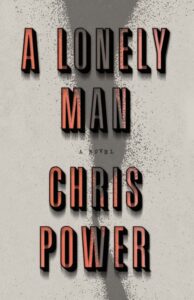
Chris Power, A Lonely Man
(FSG)
“Chris Power’s elegant first novel is a slyly ensnaring literary thriller written in immaculate prose … an almost self-effacing commitment to unadorned clarity … Power’s restraint pays off, making for a subtly immersive read, his sentences rippling like clear water even as the story’s murkier undertow pulls you out to sea. He doesn’t skimp on themes either, raising interesting questions about whether stories draw their power from reality or imagination, who (if anyone) owns them, and what privileges narrative control confers on the teller. Contemporary socio-political issues aside, A Lonely Man is a gripping and deftly controlled novel that proves Power is as good at writing books as he is at writing about them.”
–Louie Conway (Vanity Fair)
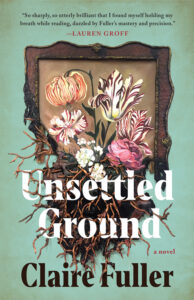
Claire Fuller, Unsettled Ground
(Tin House Books)
“… gorgeous, specific descriptions abound throughout the book … That the twins are resilient is clear early on, as they stoically face their mother’s death. But it’s their soft spots, their desires and wishes, their memories, and their musical talent…that slowly unfold throughout the narrative, giving readers glimpses at just how rich people’s lives can be even when they’re small, secluded, and private. Unsettled Ground is a terribly beautiful book, and although its premise may seem quiet, it is full of dramatic twists and turns right up until its moving, beautiful end.”
–Ilana Masad (NPR)
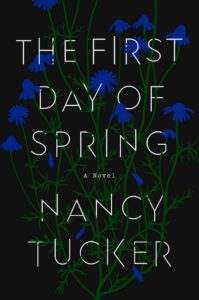
Nancy Tucker, The First Day of Spring
(Riverhead Books)
“… gripping, unsettling … Chrissie’s observations are immaculate, loyal to her age and her desperation … The most moving passages of the novel come in her scrabble to endow her parents with rational kindness … Starvation is so well captured here: the relentless, obsessive drudgery of it, ‘a form of madness.’ Chrissie is fascinated and repulsed by bodies better nourished than her own. At first, this fixation feels excessive, exhausting…But as Tucker opens Chrissie’s small, sparse world, this too becomes pitiful. In other people’s flesh, she can’t help seeing food … There’s a unique, visceral fear for children who are murderers — you know those mug shots as well as I do — and Tucker sets that against our hope for redemption … There is misery here, but there is also a dour British humor … By the end of the novel, the voices of Chrissie and Julia reside deep in your skull: visceral and wicked, sad and wonderful, all at the same time.”
–Abigail Dean (The New York Times Book Review)
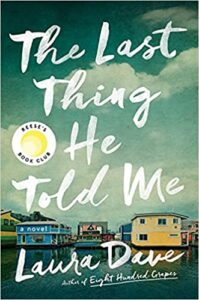
Laura Dave, The Last Thing He Told Me
(Simon and Schuster)
“In this era of domestic thrillers, a novel about a functional, loving family can feel refreshing and downright unexpected … The drama gets a little thin in spots … Downplaying the conflict might be a trade-off for the novel’s greater focus on character development and relationships. Hannah’s insights and epiphanies about how to parent an untrusting teenager aren’t all that revelatory, but they certainly are reminders of what’s most important … As a result, Dave pulls off something that feels both new and familiar: a novel of domestic suspense that unnerves, then reassures … Dave has given readers what many people crave right now—a thoroughly engrossing yet comforting distraction.”
–Carole V. Bell (Bookpage)

Jean Hanff Korelitz, The Plot
(Celadon)
“The premise is a gold mine: it generates a dazzling twist, invites deliberation on an artist’s moral obligations, and sets up some droll razzing of the publishing industry’s wheeler-dealings. Korelitz demonstrates masterful control with her incremental release of the big reveals…As they did in the fictional universe of The Plot, Oprah and Spielberg would do well to rally around Korelitz’s lollapalooza.”
–Nell Berram (Shelf Awareness)
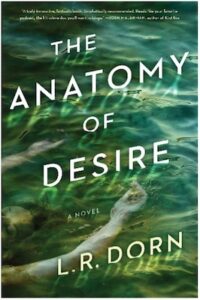
L.R. Dorn, The Anatomy of Desire
(William Morrow)
“Centered on the world of social media influencers, the pseudonymous Dorn’s remarkable debut takes the form of a true crime docuseries … With no witnesses to the murder, readers will breathlessly await the verdict. Dorn, the pen name of husband-and-wife team Matt Dorff and Suzanne Dunn, is definitely a writer to watch.”
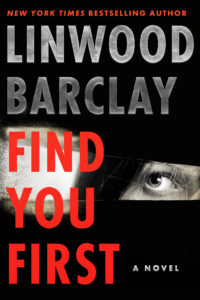
Linwood Barclay, Find You First
(William Morrow)
“Near the start of Mr. Barclay’s whirligig of a novel, the unmarried Miles is hit with life-changing information: He has a debilitating hereditary disease that will leave him physically helpless before killing him … Mr. Barclay is known for keeping readers on the edge of their seats. In Find You First, he surpasses his own past successes with a multi-strand plot that bounces, in short, cliff-hanging chapters, from Springfield, Mass., to Fort Wayne, Ind., to Paris, France. As Miles travels far and wide, he begins to surmise that his fortune, and the question of who will inherit it, may be imperiling the lives of his offspring.”
–Tom Nolan (The Wall Street Journal)

C Robert Cargill, Day Zero
(Harper Voyager)
“Cargill is a gifted storyteller, and, with his robotic central character, he pulls off quite a feat: he makes Pounce a sympathetic, compassionate, deeply human protagonist—a real being, not a mere machine. His near-future postapocalyptic world, too, is abundantly real, so firmly anchored in our own reality that we feel as though Cargill’s vision of the future is not merely possible but likely … Cargill offers a fascinating and intellectually engaging take on the venerable robots-versus-humans theme. An absolute must-read.”
–David Pitt (Booklist)

Ragnar Jonasson, The Girl Who Died
(Minotaur)
“There are not many thriller authors embodying the icy, chilly crime noir genre like Icelandic writer Ragnar Jónasson … a haunting tale with prose as chilly as the Icelandic winter season in which it is set. Jónasson is an immensely gifted writer who brings even the smallest, most remote areas of his country to vivid life and creates a story that readers will not soon forget.”
-Ray Palen (Bookreporter)

Stacey Abrams, While Justice Sleeps
(Doubleday)
“The book is a page-turner, plot-driven in the extreme, and at times terribly entertaining. Abrams is smart about Washington and often amusing about human nature. And she is clear-eyed about America … sets itself up nicely to be the first in a possible series — we can imagine Avery finding herself in other sticky situations, solving puzzles others can’t begin to tackle. Does it succeed as well on a literary scale? No, but that’s not what a book like this is for. Like watching an episode of Scandal, sipping wine, and snacking on popcorn along with its charismatic lead, Olivia Pope, While Justice Sleeps is meant to keep your brain pleasantly occupied, and at that mission, it succeeds brilliantly.”
-Kate Tuttle (The Boston Globe)


















